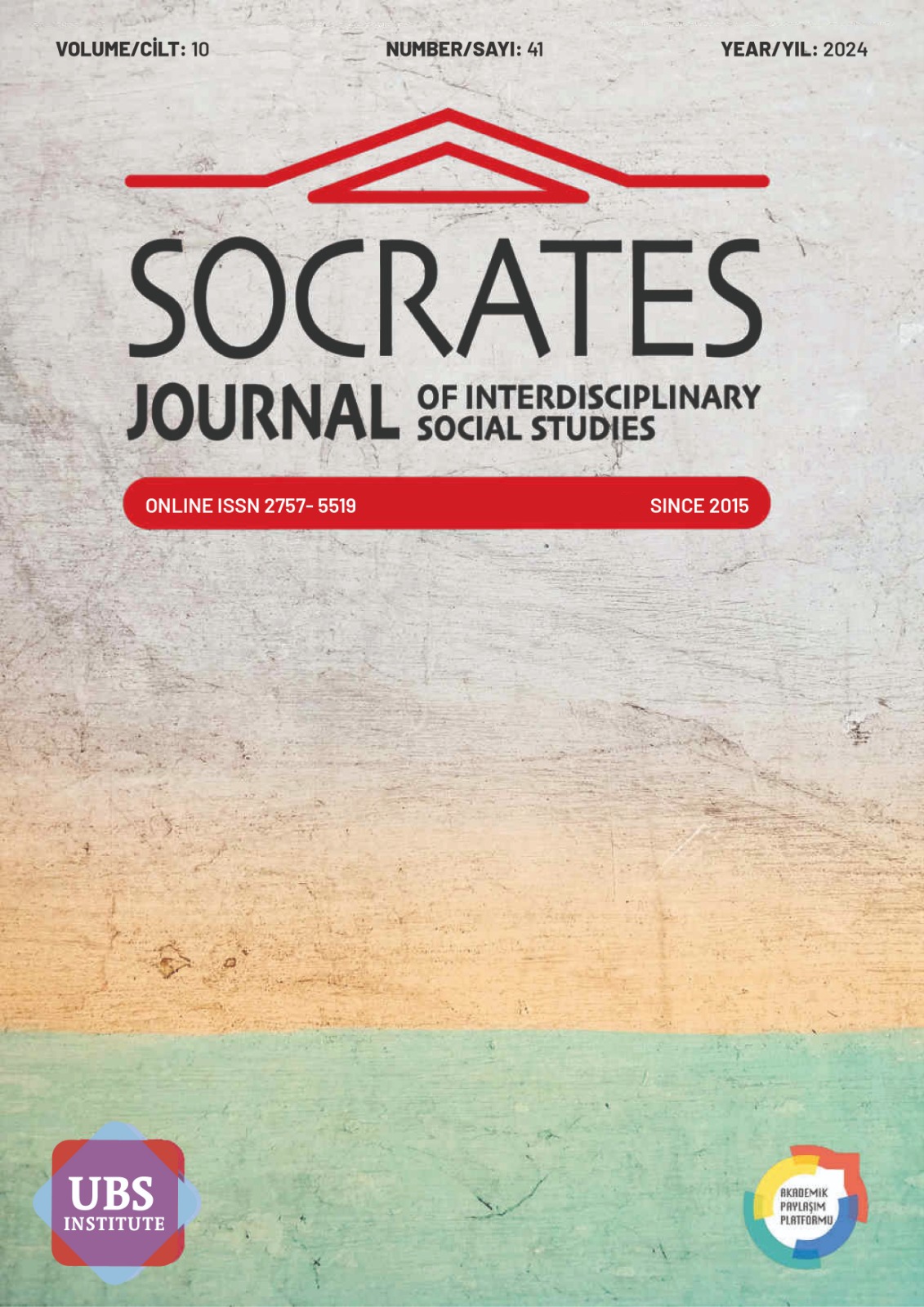ÖĞRETMENLİK MESLEK KANUNU İLE İLGİLİ ÖĞRETMEN GÖRÜŞLERİNİN BELİRLENMESİ
DETERMINING TEACHER OPINIONS REGARDING THE TEACHING PROFESSION LAW
DOI:
https://doi.org/10.5281/zenodo.11253269Keywords:
Öğretmen, Öğretmenlik Mesleği, Kariyer BasamaklarıAbstract
This research aimed to determine teachers' opinions about the Teaching Profession Law. Qualitative research model was used in this research process. In addition, the phenomenology design, one of the qualitative research designs, was used in the research. A semi-structured interview form was used inthe research. The semi-structured interview form offers the interviewee the opportunity to express himself. The semi-structured interview form leaves room for the interviewer to change the order of the questions, and a more conversational method can be adopted. Criterion sampling method, one of the purposeful sampling methods, was used in the selection of participants in the study. Criterion sampling is studies that meet various predetermined criteria. The basic criterion in this research is to be able to express the experience, expectations and deficiencies regarding the application of career steps, to have completed at least 10 years in the teaching profession and to have the conditions to take the teaching profession career steps exam. As a data collection tool, 9questions in the semi-structured interview form were asked to the participants. Long-term interaction, expert review, triangulation and participant confirmation were carried out to ensure the internal validity of the research, that is, its "credibility". In order to ensure the external validity of the research, that is, its transferability, the studies carried out were explained in detail. In addition, a "consistency review" was conducted to ensure internal reliability and a "confirmation review" was conducted to ensure external reliability. Research data was collected as a result of interviews held between 19 December and 25 December 2023. Content analysis method was used to analyze the data. Content analysis is more comprehensive than descriptive analysis. Content analysis is an analysis method that "brings together similar data to create a theme and explains the data in a way that the reader can understand."
References
Akyüz, Y. (1999, Kasım). Cumhuriyette günümüze öğretmenlik mesleğine ve toplumdaki imajına bir bakış ve tarihten çıkarılmayan dersler. 21. Yüzyılın Esiğinde Türk Eğitim Sistemi Ulusal Sempozyumu’nda sunulmuş bildiri. Öğretmen Hüseyin Hüsnü Tekışık Eğitim Araştırma Geliştirme Merkezi, Ankara.
Ataünal, A. (2003). Niçin ve nasıl bir öğretmen? Ankara: Millî Eğitim Vakfı Yayınları.
Bakan, S. (2013). Eğitimde kalitenin artırılması ve öğretmenlerin özlük hakları açısından kariyer basamakları uygulamasının değerlendirilmesi (Samsun ili örneği). (Yüksek Lisans Tezi). https://tez.yok.gov.tr/UlusalTezMerkezi sayfasından 01.12.2022 tarihinde erişilmiştir.
Bakioğlu, A. ve Banoğlu, K. (2013). Öğretmenlikte kariyer basamakları uygulamasına ilişkin öğretmen görüşlerinin metaforlar ve sosyal ağ analizi yöntemiyle incelenmesi. M.Ü. Atatürk Eğitim Fakültesi Eğitim Bilimleri Dergisi, 37, 28-55.
Bal, H. (2022). Çift kariyerli öğretmenlerin kariyer gelişimlerinin incelenmesi. (Yüksek Lisans Tezi). https://tez.yok.gov.tr/UlusalTezMerkezi sayfasından 01.12.2022 tarihinde erişilmiştir.
Balcı, A. (2000). İki binli yıllarda Türk millî eğitim sisteminin örgütlenmesi ve yönetimi. Kuram ve Uygulamada Eğitim Yönetimi Dergisi, 24(24), 495-508.
Büyüköztürk, Ş., Kılıç-Çakmak, E., Akgün, Ö. E., Karadeniz, Ş. ve Demirel, F. (2016). Bilimsel araştırma yöntemleri. Ankara: Pegem A.
Can, H., Akgün, A. ve Kavuncubaşı, Ş. (2001). Kamu ve özel kesimde insan kaynakları yönetimi. Ankara: Siyasal.
Cantürk, G. (2021). Öğretmenlerin karşılaştıkları ekonomik sorunlar ve maaş artışı talepleriyle ilgili görüşleri: Twitter analizi. Maarif Mektepleri Uluslararası Eğitim Bilimleri Dergisi, 5(2), 202-223.
Çalık, T. (2003). Öğrenen örgütler olarak Eğitim Kurumları. Manas Üniversitesi Sosyal Bilimler Dergisi, 4(8), 115-130.
Deniz, B. (2009). Kariyer basamakları uygulamasının öğretmenlerin motivasyonları üzerine etkisi. (Yüksek Lisans Tezi). https://tez.yok.gov.tr/UlusalTezMerkezi sayfasından 01.12.2022 tarihinde erişilmiştir.
Erdoğmuş, N. (2003). Kariyer geliştirme. Ankara: Nobel.
Gömleksiz, M. N. (2003). Öğretmenlik mesleğinin nitelikleri. M. Taşpınar (Ed.), Öğretmenlik mesleği içinde (s.150-167). (2.baskı). Ankara: Üniversite Kitapevi.
Karaköse, T. (2005). Öğretmen gereksinimleri ve motivasyon. Bilim ve Aklın Aydınlığında Eğitim, 69, 31-34.
Köksal, N. (2008). Öğretmenlik mesleği genel yeterliklerinin öğretmen, müdür ve bakanlık yetkilileri tarafından değerlendirilmesi. Pamukkale Üniversitesi Eğitim Fakültesi Dergisi, 23, 36-46.
Marlow, E. (2002). Assessing teacher recruitment and the public schools. https://files.eric.ed.gov/fulltext/ED460151.pdf adresinden 10.12.2022 tarihinde erişilmiştir.
Millî Eğitim Bakanlığı, (2005). Öğretmenlik Kariyer Basamaklarında Yükselme Yönetmeliği. https://www.resmigazete.gov.tr/eskiler/2005/08/20050813-2.htm adresinden 05.12.2022 erişilmiştir.
Özdemir, S., Yalın, H. & Sezgin, F. (2004). Öğretmenlik mesleğine giriş. (5.Baskı). Ankara: Nobel.
Seferoğlu, S. S. (2003). Öğretmen yeterlilikleri ve mesleki gelişim. Bilim ve Aklın Aydınlığında Eğitim, 58, 40-45.
Şişman, M. & Taşdemir, İ. (2008). Türk eğitim sistemi ve okul yönetimi. Ankara: Pegem A.
Türk Dil Kurumu, (2015). Büyük Türkçe sözlüğü. Ankara: TDK.
Yıldırım, A. & Şimşek, H. (2021). Sosyal bilimlerde nitel araştırma yöntemleri. Ankara: Seçkin.
Downloads
Published
How to Cite
Issue
Section
License
Copyright (c) 2024 Socrates Journal of Interdisciplinary Social Studies

This work is licensed under a Creative Commons Attribution 4.0 International License.


